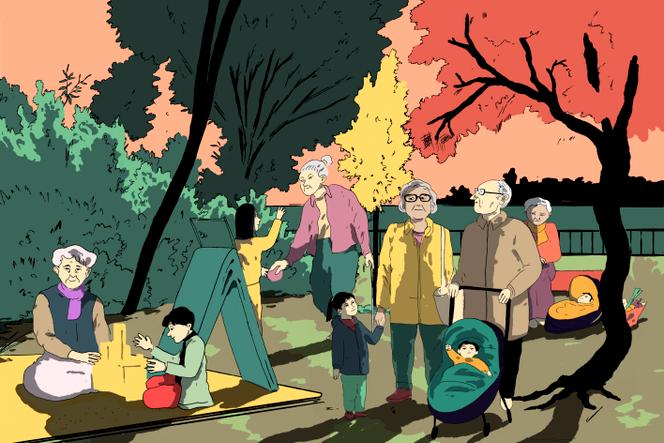


The soft autumn sun peeks through the trees of Xiangyang Park, a small green space wedged between office towers and the narrow streets of the former French Concession in the heart of Shanghai. In the late afternoon, the park is a haven for the elderly: Some men are playing cards amidst a crowd of curious onlookers, while others are doing a few movements of qigong, a traditional Chinese movement practice.
However, some are focused, busy pushing a baby carriage or keeping an eye on a toddler dashing away on a scooter. With her husband, Fu Qingwen, 68, looks after their nine-month-old granddaughter full-time, a chubby baby who stares at us from her baby carriage with her big black eyes. "It's exhausting," her grandmother said. "My daughter and son-in-law live on the other side of Shanghai. They work a lot, so they only come at weekends and leave her with us during the week. Since she was born, I've been the one to get up every night when she wakes up." Her grandfather, silent, flicks away a fly that is annoying the child.
In China, grandparents are key players in bringing up children. According to a 2017 study of six major cities by the China Education Society, they take part in childcare in 80% of homes before children begin elementary school (kindergarten is not compulsory), and in 60% of homes after that. It's a situation facilitated by the tradition of living with three generations under one roof, but also imposed by the lack of kindergartens, the number of which has melted away with the disappearance of the danwei, the work units that governed the professional and private lives of urban Chinese until the 1980s. The option of nannies exists, but many don't have enough confidence in them to entrust their children to them. While part-time work is not widespread, grandparents are indispensable if women want to keep their jobs.
However, many grandparents get tired. In Xiangyang Park, while most of the elderly say they are happy to take care of their offspring, they unanimously point out that it's an arduous task. "When I had my daughter, I went back to work after three months, leaving her at my danwei's kindergarten. It went really well. And then she ate what we ate. Nowadays, you can't let them eat too much salt or too much fat. You have to cook especially for them," Fu Qingwen said. When asked if she'd be prepared to welcome a second grandchild, now that China is encouraging couples to procreate, she said: "In our day, you risked a fine if you had more than one child [owing to the one-child policy]. Now it's the opposite! My daughter is thinking about it, but I can't do anymore: I have a bad back and diabetes, so her other grandparents would have to pitch in."
You have 60% of this article left to read. The rest is for subscribers only.
